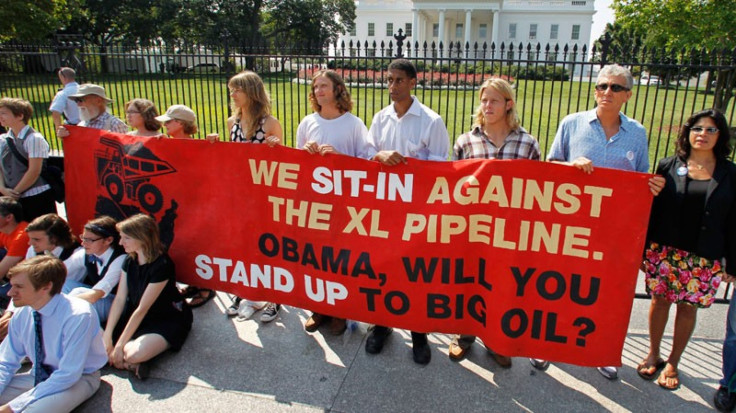Keystone XL Pipeline Decision Likely Delayed; Obama Won't Compromise Health and Safety

PresidentBarack Obama indicated that he will be the one to make the final decision regarding the construction of the TransCanada Keystone XL oil pipeline that would run from Alberta, Canada to Texas, a controversial proposal that has been protested by environmental groups who say the project could potentially have devastating ecological impacts.
While the U.S. State Department, which has jurisdiction over the construction since it crosses an international border, initially said it expected to make its final decision by the end of the year, on Wednesday Victoria Nuland, a spokesperson for the agency, said the department may not meet that target.
We'd like to get it done by the end of the year, but if thoroughness demands a little bit more time, nobody's slammed the door on that, Nuland said.
Nuland's statement confirmed a report from Reuters last week that quoted an unnamed U.S. official as saying approval of the oil sands pipeline may be delayed.
Obama Weighing Environmental, Energy Impact
Obama echoed that sentiment during an interview with a local Nebraska television station on Tuesday.
During the interview, the president said health, environmental and economic factors will be taken into account when deciding whether to approve the pipeline and said the State Department would give him a report on the issue over the next several months.
My general attitude is, what's best for the American people? What's best for our economy both short term and long term? But also what's best for the health of the American people? Obama said. I think folks in Nebraska like all across the country aren't going to say to themselves, 'We'll take a few thousand jobs' if it means that our kids are potentially drinking water that would damage their health or if rich land that's so important to agriculture in Nebraska ends up being adversely affected.'
The $7 billion project would deliver approximately 700,000 barrels of tar sands oil to refineries on the Gulf of Mexico in a 1,661-mile pipeline that would cross through Montana, South Dakota, Nebraska, Kansas, Oklahoma, and Texas.
Environmental groups, concerned citizens and some Democrats are concerned the pipeline could pollute air and water supplies, harm local wildlife, produce excessive greenhouse emissions and potentially lead to a catastrophic oil spill.
Tar Sands Action, which organized mass sit-in in front of the White House in August that led to the arrest of more than 1,200 environmental activists, reports that a rupture in the pipeline could cause a BP-style oil spill in the nation's heartland, potentially contaminating fresh drinking water and agricultural grounds.
Tar Sands Action is currently planning another event on Sunday Nov. 6, where protesters will circle the White House in protest of the pipeline.
Concern About Risk to Ogallala Aquifer
The Nebraska state legislature has reportedly opened a special session to consider ways of forcing a rerouting of the pipeline away from the state's Ogallala Aquifer, one of the world's largest aquifers that provides water to more than 1.5 million people. The aquifer reportedly has a shallow water table and porous sand that makes it especially susceptible to contamination.
A final environmental review by the State Department released in August determined there would be no significant ecological impacts to U.S. natural resources as a result of the pipeline. However, the U.S. Environmental Protection Agency has previously said the State Department needed to conduct further research on the impact of groundwater and air pollution, as well as pipeline safety.
The TransCanada told The Montreal Gazette it has agreed to 57 additional safety measures intended at preventing a leak at the Ogallala Aquifer, providing a degree of safety greater than any typically constructed pipeline.
On Wednesday, White House Spokesman Jay Carney confirmed that the final decision on the pipeline will reflect President Obama's views as this is the Obama administration.
The State Department is running the process and it comes up with a determination. But all of the criteria the president cited in that same interview yesterday ... that have to be considered, and that's public health, national security, jobs and the economy, Carney said.
© Copyright IBTimes 2024. All rights reserved.











